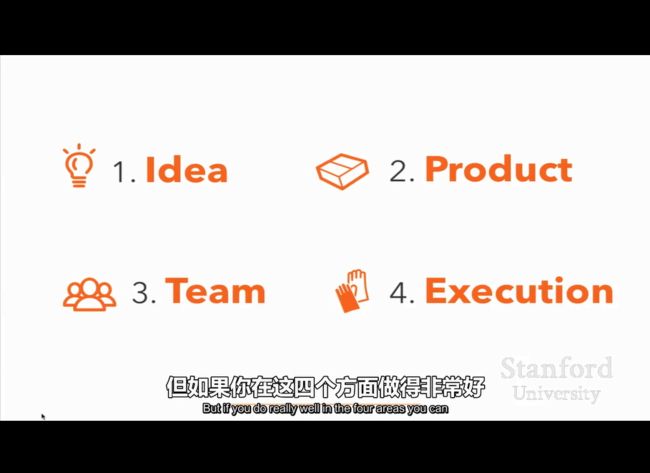第一课 创业点子、产品、团队和执行1&为什么要创业
课程地址
只有30%是可以通过讲座传达的,其余都是实际经验
Poor and innocence对创业很好
明确的激情在先,创业在后。You should only start a starup until you feel compuled to solve a problem, and starting a company is the best way to solve it.
Idea
1. 一路演化的主意不可取。
虽然好的执行是十倍于创意的价值,而且用户拿到手前你也所知有限。但这种公司大多都失败了。
2. 要有伟大的主意才创业。
大多数成功企业都是从伟大的主意开始,是他们自己需要的。(不是很同意,facebook就不是这样,但是他的试错成本很低,杨勃做豆瓣之前一开始做的那个旅游的分享也不火。尝试创业失败几次之后就会有不断推翻自己不成熟的想法)If you have multiple ideas that all seem pretty good, work on the one that you think about most often when you're not trying to think about work. 直到你深爱的那个主意出现前,不要创业。创业通常要十年,你会浪费做自己想做的创意的时间。
The company should feel like an important mission. You would get more support on a hard important challenge than a derivative one. Companies that copy an existing idea with few new insights don't excite people, and they don't compell the team to work hard enough.
伟大的主意听起来都很糟,这样才会没什么人steal去做。好主意都要垄断的,但是先找一个小市场垄断first you have to find a small market that you can get monopoly.(大市场的垄断facebook都会去做)
一个创业公司不能改变他的市场,所以你要选一个快速增长的市场。
你要选一个你自己需要的东西,如果不是你自己需要的,那你有一个很大的弱势,要尽量与用户保持最近的距离,最好你能在他们的办公室里面工作,每天跟他们交流多次。
好的主意都是一句话就能描述清楚的。
Product
Product is anything involved in your customer's interaction with what you built for them.
专注产品,然后才是运营、广告等等。
Before you built a great product, you shouldn't worry about anything but talking to your customer and build your product.
要创造用户非常喜爱的东西,而不是还不错。Create something people want but only a medium amount(like not super love) is a great way to fail.为小部分人打造他们很喜爱的东西,然后扩大人群。而不是大部分人觉得还不错的东西。如果这小部分人love your product , they would tell others.
Don't worry about how much money your competitor raised or what they're doing. Very few competitors die from competition.Most of them die because they failed to build great products. They spend their energy doing something else.
从简单的东西入手。It's much eaier to make a great product if you have something simple. Complex plan can start with a small set of the product too.
简单才能极致。Simple forces you to do sth extremely well.
创始人对产品的细节都十分狂热,所以才能成功。The founders feel phisically pain when their product sucks, so they want to wake up and fix it. They don't ship crap. Even if they do, they fix it very quickly.
一开始并不需要打广告,不需要那么多用户。
Go recruite users that can give you feedback everyday by hand. Pinterest 创始人到处在咖啡店转悠让人家试他的网站,甚至跑去苹果店把人家主页改为Pinterest. 询问用户喜欢什么,不喜欢什么,会为什么付费。产品的哪里会让他们向朋友推荐。如果公司跑了会不会失望。
One of the great advantage of a software startup is how short you can make your feedback loop. It could be in hours.好的创始人不会让其他人接入他和用户之间。不要一开始就请客服和销售。
Metrics度量指标--
Use Metrics to keep yourself honest on this.
不要管Total registrations. 关注 Active users, activity levels, cohort retention(留存率), Revenue,Net promoter score。
为什么要创业
创业非常辛苦,如果成功,你要在这公司花至少十年时间,如果不成功,你也要留五年,3年看营业状态好不好再谈收购,2年待在被收购企业。
CEO最重要的任务是managing your own psychology. 保持健康是第一要务。
创业CEO不会是权力金字塔的顶端,事实上,所有人都是你的BOSS,the life of most CEOs is reporting to everyone else, employees, customers,partners,media...想要权力,去军队或者政治。别创业。
You are always on call. You are a role model(can't take your foot off the gas). You are always working anyway.
在大公司里面做一个项目也能影响很多人,也能赚很多钱,比如Google maps,或者是Facebook的hackathon上做出来的点赞功能。
不要创业,除非你super passion about it, you're the right person to make that happen.
Passion--you need to do it.
如果你没有passion,员工会潜意识感觉到,然后会失去干
劲。你自己也无法度过那些动摇和困难的时候。
Aptitude--the world NEEDS it. needs YOU to do it.
如果你不做这个项目,会怎么样?如果你一直没看到解决方案,只是一些微创新的话,那你很值得去做。
创办Asana的时候,他们白天在做facebook的日常项目,晚上和项目负责人讨论各种新点子,they are so passionate about the idea that they couldn't do anything else. 这个点子自己忍耐不住要来到这个世界一样。The idea was like beating itself out of our chest,forcing itself into the world.
